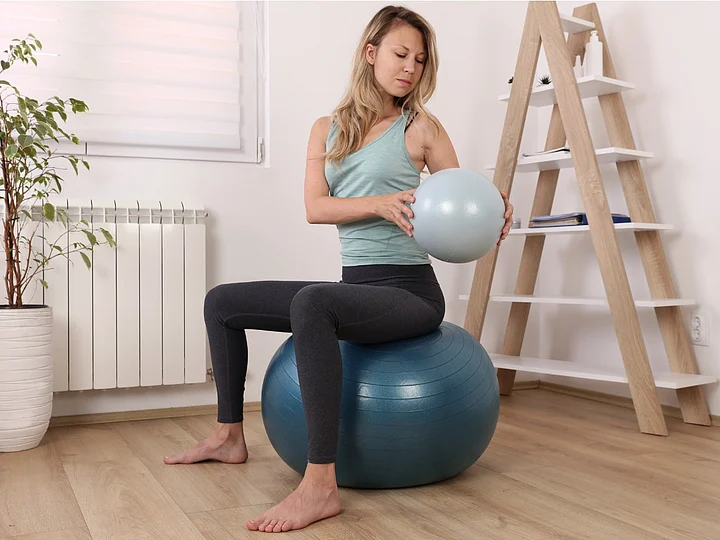The pelvic floor muscles are an important set of muscles in the human body. They are deep muscles situated in the pelvis, running from the frontal pubic bone to the base of the spine.
It is shaped like a basin and holds all of the pelvic organs (uterus, vagina, bowel and bladder) and supports the bladder to provide control while urinating. Strong pelvic floor muscles can help maintain stronger core strength in the abs, improved sexual sensitivity, and better posture.
The weak pelvic floor can be a result of a number of reasons like pregnancy, childbirth, heavy sports, exercise regimes, menopause, natural ageing, and pelvic or prostate surgeries.
Since we have discussed so much about pelvic floor muscles and their weakness. Let's know about a few yoga poses that can help strengthen those pelvic muscles.
1. Wide-Legged Forward Bend Pose
You can perform this pose by standing with your feet about 6 inches apart and folding the chest to the ground. Try reaching toward the flat surface or bend the arms, and clutch the opposite elbow with the opposite hand.
This pose not only helps deal with insomnia but reduces the frequency of headaches, and lower back pain as well. This yoga pose also helps with anxiety. You must make sure that while performing the pose, you sway a little side-to-side and inhale. Bend your knees as much as required to prevent strain. Gradually, you will feel the tension in the hips and legs releasing.
2. Downward Facing Dog Pose
This is one of the traditional yoga poses in which you bend forward. It can be restful and rejuvenating. This pose can help relieve back pain and sciatica as well. It helps manage imbalance and improves the strength of the pelvic floor muscles.
The pose focuses on muscles like hamstrings, deltoids, gluteus maximus, triceps, and quadriceps. You should:
Get on all fours.
Your hands should be aligned under your wrists and your knees under your hips.
Press into your hands, tuck your toes, and lift up your knees.
Move your sitting bones slowly up toward the ceiling.
Slightly bend your knees and lengthen your spine and tail bone.
Your heels should be slightly off the ground.
Press firmly into your hands and distribute the weight on both sides of the body.
Pay attention to the position of your hips and shoulders.
Your head should be in line with your upper arms and your chin tucked in slightly.
Hold this pose for at least one minute.
3. Bridge Pose
Bridge pose helps regulate blood pressure. It calms the brain and alleviates stress. It is beneficial in managing mild depression and is good for abdominal organs, lungs, menstrual pain, fatigue, headache, and anxiety.
Lie on your back and place your hands at your sides, bend your knees, and your feet should be flat on the floor close to your butt.
Press into your feet while you lift your hips and torso to create a straight line from your knees to your shoulders.
Hold the pose for up to 30 seconds, then lower your hips to the floor.
4. Warrior Pose
The warrior pose is another traditional pose practised by people with various medical conditions, one of which is weak pelvic muscles. This yoga pose helps in strengthening the arms, legs, and lower back as well. You can:
Stand up with legs 4 to 5 feet apart.
Place your right foot at a 90-degree angle and your right toe should point out at an angle of 45 degrees.
Place your hands at shoulder level, parallel to the ground.
Bend your right knee and look towards your right.
Your hips should be square and the right thigh should be parallel to the ground.
Hold the pose for 10 to 15 seconds and release the posture.
5. Cat-Cow Pose
The cat-cow pose is a gentle, simple pose that includes backbend stretches and helps mobilise the spine. This pose helps stretch your torso, shoulders, and neck.
This yoga pose focuses on various muscle groups like erector spinae, rectus abdominis, triceps, serratus anterior, and gluteus maximus.
You can follow these steps:
Go on all fours.
Your wrists go underneath your shoulders, and your knees will be placed underneath your hips.
Make sure you balance your weight evenly on all fours.
Breathe in and look up, let your stomach drop down toward the mat
Breathe out and tuck your chin into your chest, draw your navel toward your spine, and your spine should be arched towards the ceiling.
Maintain focus while you practise this pose.
Focus on releasing tension in your body.
Hold the pose for at least 1 minute.
(At The Quint, we question everything. Play an active role in shaping our journalism by becoming a member today.)
